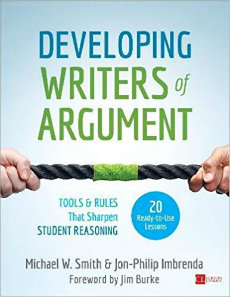20 High-Interest Lessons for Argumentative Writing
Developing Writers of Argument: Tools and Rules That Sharpen Student Reasoning
By Michael W. Smith, Ph.D., and Jon-Philip Imbrenda, Ph.D.
(Corwin/Sage, 2018 – Learn more)

Teaching students to write, and write well, is a constant struggle in the middle school classroom. Students are facing issues with stamina, motivation, and lack of knowledge growing out of past instruction that focused more in reading.
With the push to implement new curriculum with a stronger writing emphasis, there can sometimes be confusion about how to best teach it as educators find themselves exploring best writing practices at a new depth. A guide that helps us review techniques and strategies effectively is an invaluable addition to the middle school ELA teacher’s toolbox for student success.

The authors’ practical tools and techniques lend themselves to collaborative reasoning, as well as teaching a sense of responsibility to students as they progress through the lessons.
There is a natural progression – each lesson feeds on the one(s) before it – and by the end of the 20-lesson sequence, students will have grown in their abilities to craft and defend their arguments.
Making the argument for argumentative writing
Getting to the heart of the difference between argument and persuasive writing is imperative to helping students excel. The book begins by creating an “argument for argument” where Smith and Imbrenda discuss the importance of developing strong writers.
One of this book’s most beneficial features is Chapter 3 which gives the pedagogical background and justification for all the recommended lessons. For anyone who may face push-back from administration, this chapter is key to helping them understand the purpose and direction of the book.
A practical, easy-to-use presentation
The lessons are straightforward and organized in a logical, practical manner. While each lesson builds from the previous ones, they could be delivered over stretches of time. Though some of the lessons appear to be geared toward upper grades, the lessons are written in a manner that is easily differentiated for younger students or those with IEPs.
The book does specify that it is intended for grades 6-12, but the majority of the lessons seem to be written with high school students in mind. The lessons include handouts and can easily be grouped into an effective unit on argument writing.
Oddly, it is not until Chapter 8 that the authors discuss how to use this book. Perhaps it is because they intend readers to thumb through the book discovering its gems for themselves. There are some exemplary student examples, but there are no rubrics included with the lessons. Regardless, this book is perfect for those who are looking for innovative (and relevant) lessons that zero in on argumentative writing.
Cross-curricular possibilities
Because many of the lessons are based around current events and pop culture, they afford the option to implement these lessons in classes other than language arts. Specifically, there could be cross-curricular lessons between language arts and social studies where students argue the benefits and detriments of Apple Music vs. Spotify (Lesson 1). The flexibility of the lessons works to their benefit, and the topics of the lessons are engaging and high interest.
Erin Corrigan-Smith is a middle school ELA teacher in a suburb of Atlanta. She has a B.A. and M.A. in English, and her focus of study is children’s literature. During the school year, she is faculty advisor to the cooking club and drama club. In her downtime, she enjoys going to her family’s cabin in the North Georgia mountains with her husband and dog to read and relax.



































